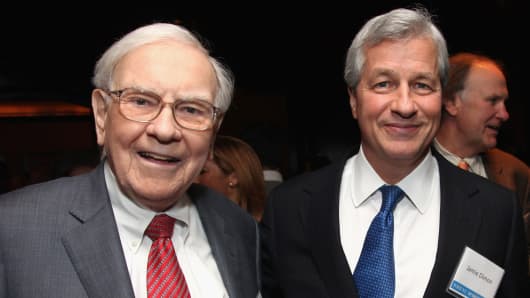Amazon, JPMorgan Chase and Berkshire Hathaway made headlines Tuesday morning by announcing their plans to jointly create a non-profit health care company to cut costs and improve services for their combined 1.1 million workers.
This could be the true price-reducing disruption to the health care sector the U.S. economy and its citizens have wanted for decades.
But there are some important questions that need to be answered.
The biggest question is what this new team of tech, investment and financial titans is going to do with this entity? Will it actually provide care and not just "access to care?" Will it negotiate better prices for their employees? Will it just make investments in the sector overall?
The markets are telling us the answer is possibly, "all of the above."
Several health care sector companies saw their shares fall moments after the news broke, but it was the big health insurers that were hit the hardest. Shares of UnitedHealth fell about seven percent in the pre-market and remained the biggest drag on the Dow through the trading day. That was a clear indicator that insurance industry investors believe this new company will identify them as non-essential middle men and cut them out.
That would be the best place for the new partnership to start. Private insurers simply haven't done enough to control costs and offer the best options for the Americans lucky enough to have employer-provided health coverage. It may or may not be the health insurers' fault, but they're not solving the problem.
Obamacare didn't solve it, either. The promised cost savings didn't materialize for a number of reasons. But the biggest reason was not enough young and healthy Americans signed up for health insurance to spread the costs of caring for the sickest patients.
At its essence, Obamacare isn't a government program as much as an attempt to shore up and make private health insurance better. Insurance companies are really private sector companies in name only, as they operate so much in concert with federal and state government systems. That partnership has made a lot of insurance company executives very rich. But it's simply not working for too many American workers and their employers, Obamacare or no Obamacare. Premium costs went up, hurting existing customers and especially private employers who say their costs to cover their employees have grown sharply.
Now back to the question of how Amazon, JPMorgan, and Berkshire can do this exactly.
First, they could open a series of in-house care facilities like the string of urgent care clinics that have sprung up across the country in recent years. This would add an enormous degree of convenience for employees while giving the employers a chance to avoid millions of dollars in losses from lost productivity or worker absences. Urgent care facilities are already a major disruptor in the health care sector. Even hospitals are starting to respond by opening their own chains or buying out existing ones. So this seems like a no-brainer good idea to start.
Next, when it comes to prescription drugs and services urgent care centers can't provide, the partnership could use its enormous financial resources and those 1.1 million employees as excellent leverage to negotiate better prices from every entity from hospitals to the drug companies.
If that doesn't provide enough savings, the new health care company could go a bold step further and buy its own hospitals and/or its own generic drug company. This seems plausible since Amazon has already been looking into some kind of deal with generic drug makers for at least two months.
Finally, the idea that the three companies would pool their efforts to speed along cost-saving medical technology is probably the surest result of all. Many hospitals across the country have already started to cut costs using state of the art technology that allows doctors in one city to remotely treat many patients in another. If this new entity does set up in-house clinics, don't be surprised if it uses just a few top doctors to treat many of its employees in multiple cities at once using remote technology.
There's one more burning question that needs to be answered: How will these efforts to shore up their own costs help the rest of America?
The easiest answer is that if other big employers see the new partnership actually succeeding, some will surely follow suit and millions more Americans will start enjoying the same benefits. But there's also the fact that Amazon has beta tested products in house that it intends to eventually offer the general public. The recent opening of Amazon's in-house automated grocery store to the public in Seattle is the latest example of that.
Whatever this new entity comes up with, there's good reason to be optimistic. The employer paid-for health insurance model didn't work. Obamacare didn't work. Things are so costly and getting worse that even this announcement of a coming attempt to cut into the cost of care is beyond just welcome.
Commentary by Jake Novak, CNBC.com senior columnist. Follow him on Twitter @jakejakeny.
For more insight from CNBC contributors, follow @CNBCopinion on Twitter.



